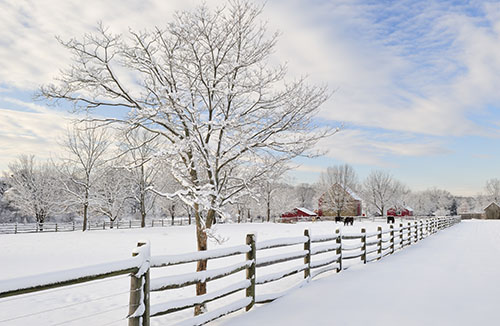Winter Farm Checklist
Dec 29, 2023

As winter blankets the landscape with a frosty charm, farmers across the state must gear up for a season of unique challenges and opportunities. From ensuring the wellbeing of livestock to safeguarding crops against freezing temperatures, a winter farm checklist is indispensable.
Keep reading for a comprehensive guide to help you navigate the winter months and keep your farm thriving.
Livestock Care
Feed and Nutrition
Crop Protection
Equipment Maintenance
Barn and Infrastructure Inspection
A well-prepared winter farm checklist is key to navigating the challenges that the cold season brings. By proactively addressing the needs of your livestock, crops, equipment, and infrastructure, you’ll not only ensure the well-being of your operation but also set the stage for a successful spring. Your local Co-op is here for all your winter farming essentials, so visit us today! Find the nearest location here.
For more content like this, check out the latest issue of The Cooperator.
Keep reading for a comprehensive guide to help you navigate the winter months and keep your farm thriving.
Livestock Care
- Shelter and bedding: Inspect and reinforce animal shelters to provide adequate protection from harsh winter conditions. Ensure proper bedding for warmth and comfort.
- Water supply: Prevent freezing water sources by investing in heated water dispensers or tank deicers. Regularly check and clean water troughs to guarantee a constant supply of fresh water for your animals.
Feed and Nutrition
- Winter feed requirements: Adjust animal feed quantities based on increased energy requirements during colder months. Contact the livestock specialist at your local Co-op to tailor a feeding plan for your livestock.
- Hay storage: Ensure proper storage of hay to prevent spoilage. A well-ventilated and dry storage area is crucial to maintaining the quality of your feed.
Crop Protection
- Cover crops: Plant cover crops to protect your soil’s health and prevent erosion during the winter. Hardy options like winter rye can provide a protective layer and enrich the soil for the upcoming growing season.
- Mulching: Mulch around vulnerable plants to insulate the soil and shield roots from freezing temperatures. This helps retain moisture and safeguards against sudden temperature fluctuations.
Equipment Maintenance
- Winterizing machinery: Service and winterize all farm equipment to ensure they operate smoothly in cold conditions. Change fluids, inspect belts, and grease moving parts to prevent breakdowns during crucial tasks.
- Snow removal equipment: Especially for those living in mountainous regions of the state, prepare your snow removal equipment before the first flurries start to fall. Clear driveways and pathways promptly to ensure smooth operations and safe access around the farm.
Barn and Infrastructure Inspection
- Roof inspection: Inspect barn roofs for potential leaks or damage that may worsen with snow accumulation. Repair any issues promptly to prevent structural damage.
- Gutter cleaning: Clean gutters to prevent ice dams and water buildup, which can compromise the integrity of buildings.
A well-prepared winter farm checklist is key to navigating the challenges that the cold season brings. By proactively addressing the needs of your livestock, crops, equipment, and infrastructure, you’ll not only ensure the well-being of your operation but also set the stage for a successful spring. Your local Co-op is here for all your winter farming essentials, so visit us today! Find the nearest location here.
For more content like this, check out the latest issue of The Cooperator.